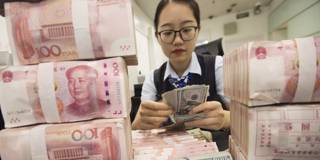Although the current poor state of Sino-American relations may make even a very limited currency détente unattainable, such a pact is not outside the realm of possibility. Ultimately, both America and China might see some advantage in taking currency conflict off the table, in the hope of preventing wider damage to themselves and others.
SANTA BARBARA – China’s currency, the renminbi, weakened slightly against the dollar at the start of this week. Around the world, the immediate response was panic. Financial markets tumbled, US President Donald Trump’s administration formally labeled China a currency manipulator, and fears of a new currency war spread like wildfire. To describe all this as an overreaction would be a gross understatement. A currency war has not erupted – at least, not yet.

SANTA BARBARA – China’s currency, the renminbi, weakened slightly against the dollar at the start of this week. Around the world, the immediate response was panic. Financial markets tumbled, US President Donald Trump’s administration formally labeled China a currency manipulator, and fears of a new currency war spread like wildfire. To describe all this as an overreaction would be a gross understatement. A currency war has not erupted – at least, not yet.